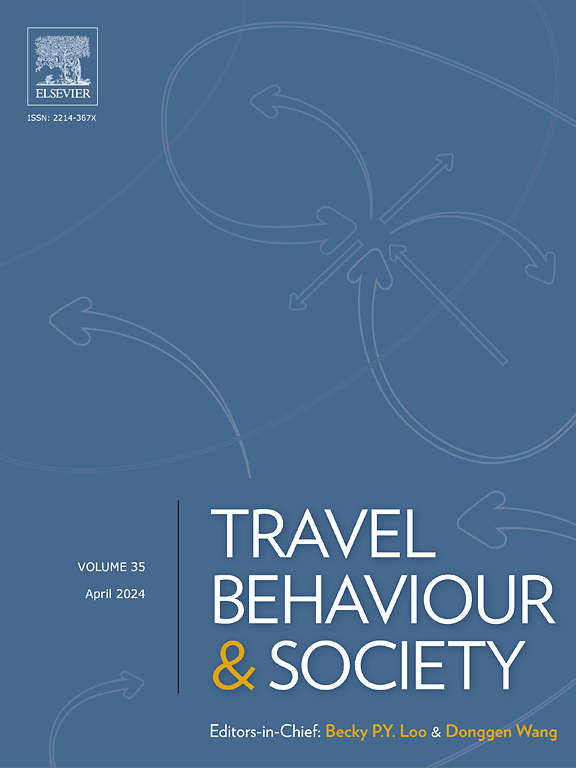Unraveling the influence of gamification on loyalty intentions in public transportation
IF 5.7
2区 工程技术
Q1 TRANSPORTATION
引用次数: 0
Abstract
Numerous studies have explored the relationship between service quality and behavioral intention or loyalty in public transportation. However, despite the increasing interest, research on alternative factors influencing user loyalty—such as gamification—remains limited. Loyalty in public transportation is a crucial aspect for understanding the sustainability of urban transportation systems, given the high dependence of the community on these services and their impact on reducing traffic congestion and pollution. Previous studies have generally focused on factors such as price, comfort, and other performance factors, while this research expands the scope by analyzing the role of psychological factors and gamification factors in influencing loyalty, thereby providing a more holistic perspective. This research investigates the influence of gamification on public transport loyalty intentions by integrating the Theory of Planned Behavior (TPB) with concepts from gamification in transportation. Data were collected from the Jakarta Metropolitan Area through online and offline surveys, yielding 1,030 valid responses. This study employs three structural equation models: SEM Partial Least Squares (PLS), SEM Ordinal, and SEM Covariance-Based (CB). The results of all models are compared for hypothesis testing. Findings reveal that gamification has a significant influence on loyalty intentions to use public transportation, both directly and indirectly, through the mediating role of TPB constructs—attitude, perceived norms, and perceived behavioral control. These results highlight the potential of gamification as an effective complementary strategy for fostering long-term user commitment to public transportation, providing policymakers and service providers with valuable insights for enhancing user engagement and sustainability in public transport systems.
揭示游戏化对公共交通忠诚意向的影响
许多研究探讨了公共交通服务质量与行为意愿或忠诚之间的关系。然而,尽管人们对游戏化越来越感兴趣,但对影响用户忠诚度的其他因素(如游戏化)的研究仍然有限。考虑到社区对公共交通服务的高度依赖及其对减少交通拥堵和污染的影响,公共交通的忠诚度是理解城市交通系统可持续性的一个关键方面。以往的研究一般侧重于价格、舒适度等性能因素,而本研究扩大了研究范围,分析了心理因素和游戏化因素对忠诚度的影响,从而提供了一个更全面的视角。本研究结合计划行为理论(TPB)与交通游戏化的概念,探讨游戏化对公共交通忠诚意向的影响。数据是通过在线和离线调查从雅加达大都市区收集的,共收到1030份有效回复。本研究采用三种结构方程模型:SEM偏最小二乘(PLS)、SEM序数(Ordinal)和SEM协方差(CB)。对所有模型的结果进行比较以进行假设检验。研究结果表明,游戏化通过态度、感知规范和感知行为控制的中介作用,直接和间接地对公共交通忠诚意向产生显著影响。这些结果突出了游戏化作为一种有效的补充战略的潜力,可以促进用户对公共交通的长期承诺,为政策制定者和服务提供商提供有价值的见解,以提高公共交通系统的用户参与度和可持续性。
本文章由计算机程序翻译,如有差异,请以英文原文为准。
求助全文
约1分钟内获得全文
求助全文
来源期刊

Travel Behaviour and Society
TRANSPORTATION-
CiteScore
9.80
自引率
7.70%
发文量
109
期刊介绍:
Travel Behaviour and Society is an interdisciplinary journal publishing high-quality original papers which report leading edge research in theories, methodologies and applications concerning transportation issues and challenges which involve the social and spatial dimensions. In particular, it provides a discussion forum for major research in travel behaviour, transportation infrastructure, transportation and environmental issues, mobility and social sustainability, transportation geographic information systems (TGIS), transportation and quality of life, transportation data collection and analysis, etc.
 求助内容:
求助内容: 应助结果提醒方式:
应助结果提醒方式:


